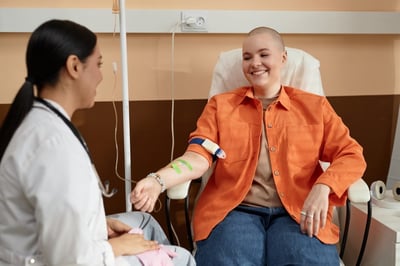Treating HER2-negative, Metastatic Breast Cancer with a BRCA or PALB2 Mutation Using a New Drug, Axatilimab, Combined with Olaparib

Treatment
Treatment study for HER2-negative, metastatic breast cancer with a BRCA1/2 or PALB2 mutation
Clinicaltrials.gov identifier:NCT06488378
Study Contact Information:
Name: Filipa Lynce, MD
Phone Number: 617-632-2335
Email: filipa_lynce@dfci.harvard.edu
About the Study
This Phase 1 clinical trial is studying a new combination of drugs to treat , or HER2-low breast cancer in people with an in , or or a tumor mutation in or . The study is looking at whether adding a new drug called axatilimab to treatment with the olaparib (Lynparza) will improve outcomes in people with breast cancer.
This Study is Open To:
People with breast cancer may be eligible if they meet all of the following:
- have or HER2-low breast cancer.
- have hormone receptor positive () or hormone receptor negative (HR-negative) cancers.
- participants with hormone receptor disease must not be eligible for hormone therapy (due to cancer progression or other factors that make them in)
- have an inherited mutation in , , or or a tumor mutation in or .
- have evidence of cancer that can be measured by imaging to track whether or not cancer is responding to treatment.
- must have received no more than two prior lines of any of the following for cancer:
- chemotherapy
- antibody-drug conjugates
- immune checkpoint inhibitors.
- must be willing to undergo 3 separate research biopsies.
Additional criteria:
- people with brain or central nervous system spread may participate if:
- they also have spread to other parts of the body that can be measured with imaging.
- they have not had progression of cancer in the brain or central nervous system after treatment for that spread.
- people who are infected with HIV or Hepatitis B or C may participate if their disease is controlled with medication.
- prior treatment with a is allowed as long as the cancer did not get worse while on, or up to a year after treatment.
- must be at least 4 weeks out from major surgery, 2 weeks out from receiving chemotherapy, or and1 week out from receiving hormone therapy.
Please see ClinicalTrials.gov for a more complete list of eligibility requirements.
This Study is NOT Open To:
- people under age 18.
- people still experiencing side effects from previous treatment.
- people with other conditions such as high blood pressure, heart disease, infection that is not controlled with medication.
This is not a full list of exclusions. Please see ClinicalTrials.gov for a more complete list.
What the Study Involves
All participants will receive the combination of both drugs, and axatilimab.
Treatment will be given in 28-day cycles.
Cycle 1 through Cycle 2:
- Day 1 and 15:
- participants will receive axalitimab as an intravenous (iv) injection.
- Days 1 through 28:
- participants will take orally 2 times daily, 12 hours apart.
Cycle 3 through End of Treatment:
- Days 1 and 15:
- participants will receive axalitimab as an intravenous (iv) injection.
- Days 1 through 28:
- participants will take orally 2 times daily, 12 hours apart.
- End of Treatment Visit with imaging
- Follow Up: Every 6 months for 3 years. Imaging will be every 10 weeks.
Biopsies
Participants will undergo repeat biopsies of their cancer:
- at the start of the study.
- after two weeks of .
- at the end of cycle 2.
Imaging
Participants will undergo repeat imaging to make sure that their cancer is not getting worse:
- at the start of the study.
- every 8 weeks during the study.
- at the end of treatment.
- every 10 weeks for up to 3 years.
Follow-up visits
Follow-up visits will continue every 6 months for 3 years.
Study Contact Information:
Name: Filipa Lynce, MD
Phone Number: 617-632-2335
Email: filipa_lynce@dfci.harvard.edu
Locations:
Massachusetts
City: Boston RECRUITING
Facility: Beth Israel Deaconess Medical Center
Contact Info:
ntung@bidmc.harvard.edu
City: Boston RECRUITING
Facility: Brigham and Women's Hospital
Contact Info:
Filipa_Lynce@DFCI.HARVARD.EDU
617-632-2335
Filipa Lynce, MD
City: Boston RECRUITING
Facility: Dana-Farber Cancer Institute
Contact Info:
Filipa_Lynce@DFCI.HARVARD.EDU
617-632-2335
Filipa Lynce, MD
Treatment
Treatment study for HER2-negative, metastatic breast cancer with a BRCA1/2 or PALB2 mutation
Clinicaltrials.gov identifier:NCT06488378
Study Contact Information:
Name: Filipa Lynce, MD
Phone Number: 617-632-2335
Email: filipa_lynce@dfci.harvard.edu